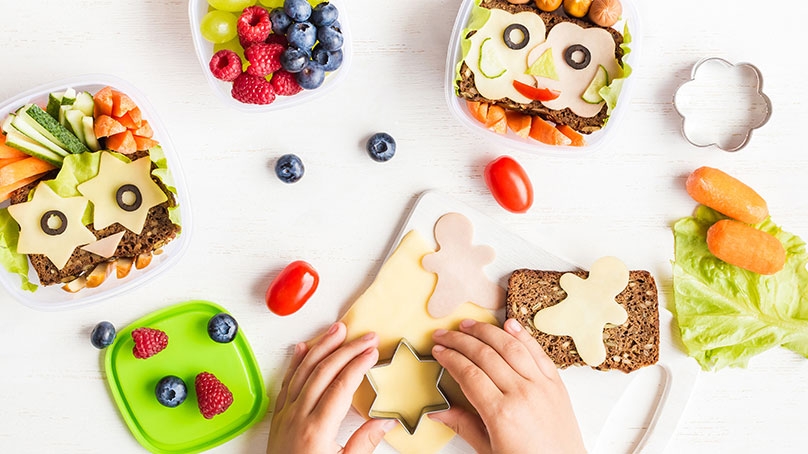School Lunch Hack: How to Prep a Week's Worth of Lunches on Sunday
August 13, 2019 | Food Lion


School Lunch Hack: How-to Prep a Week's Worth of Lunches on Sunday
The last thing you want is to forget an important part of your child's lunch as you frantically pack it in the morning (or sleepily half-pack it the night before). To supply your kids with the nourishment they need all week long, prep a week's worth of lunches on Sunday. Sound impossible? Not with tips from those in the know.
Create an assembly line
The object of packing school lunches for a week is to work smarter, not harder. To simplify your chaotic school mornings, pack as much as you can on Sunday – and invite the kids to help! They're more likely to eat what they pack themselves.
Debbie Tayman, a mother and the general manager of Hard Working Foods in Baltimore, suggests lining up a bag per child for each day of the school week and filling in as much as you can on Sunday. To be even more organized, have a designated bagging area out of the fridge and a designated fridge area for cold items. Even if your kids use lunchboxes or Bento boxes, this method allows you to keep all the lunch items together. Then each morning it's only a matter of packing up and getting your kids out the door.
Fill 'em up
Once you have your assembly line in place, the question is, what do you fill those bags with? Unless you have kids who demand the same foods at every lunch, you'll want to mix things up from day to day.
- Fruits and veggies: Apples, clementines, bananas, and cherry tomatoes don't need to be refrigerated. Grapes, strawberries, and blueberries make great fruit options when kept cold. “Cut up fruits and vegetables ahead of time and store individual portions in airtight containers, like pineapple, broccoli florets, carrot sticks, and bell pepper strips," says Dr. Sonali Ruder, physician, chef, mom, and founder of The Foodie Physician.
- Pre-bagged snack: Select a cracker, graham, raisin, or oat snack you know your kids love. “Designate a pantry shelf with 'better-for-you' packaged snack ideas, like granola bars, whole grain crackers, trail mix, nuts, and seeds," says Ruder.
- Refrigerated items: Yogurt, cheese sticks, and milk boxes are simple to buy in bulk and set aside for easy packing. Hard-boiled eggs are another simple and healthy make-ahead option. If your child is a sandwich kid, Tayman recommends pre-preparing sandwich fillings: “Portion out lunch meat, cheese, and lettuce (if your kids are willing to eat green things). Stack them and store in a plastic bag, then grab the stacks as you make sandwiches in the morning. This avoids the hassle of unwrapping each lunch meat and cheese bag each day."
Beyond sandwiches
If you have adventurous eaters, or older kids who demand more than a sandwich or cheese slices cut into cute shapes, lunches still don't have to be complicated. “We make dinners that can be reheated and taken in a thermos – soup, stews, chili, casseroles – or eaten at room temperature. As soon as dinner is over, lunches are portioned out from the leftovers for both kids and parents," says Liza Baker, health coach and owner of Simply:Health Coaching.
You know what your kid will and won't eat, so if they need incentive to dig into veggies and fruits, be sure to have dips or sauces ready to go for every lunch. “I buy a large bag of fresh pre-cut carrots and broccoli and a large container of hummus and pre-pack them for the week in snack bags for a grab-n-go," says Dr. Zarinah Hud, mother of two. Hud also recommends fruit kabobs or meat-and-cheese kabobs as an excellent sandwich alternative.
Salad in a jar is a great option for kids who like salad and can be prepped for the week if done properly – protein and dressing on the bottom, veggies and greens on top, recommends Baker. “Many parents are nervous about food safety, but if you buy whole, seasonal, organic, local, and ethical foods, cook them at home, and store them properly, most food is just fine in a lunchbox," Baker says.
Commit to planning ahead
“As a parent, the most important factor is that you want your kids to actually eat the food you bought, prepared, and packed. And, whether it is homemade or purchased, you want it to be good for them," says Tayman. “You also don't want to spend a fortune each week."
Planning ahead means you're less likely to depend too heavily on hyper-processed shelf-stable foods and instead pump your hard-working kids full of protein, fruits, and veggies to keep them going through snack time and lunchtime.






Reviews
(
)
Submit a Review
Create Your Display Name